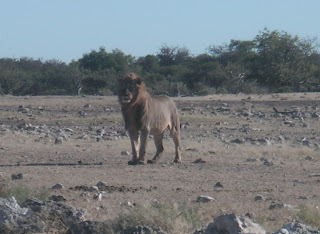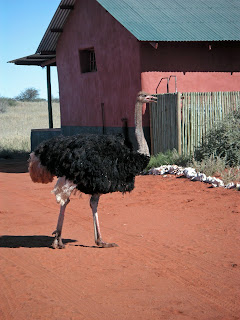Thursday started much like any Thursday. I awoke at 5.30am to a pitch black, 30+ degree morning and conducted my routine coffee and BBC news before clambering into the Toyota Landcruiser and backing out onto the road. I stopped at the compound gate momentarily to have the guard check that I wasn't stealing any electrical items or gym equipment (not sure what else they would be searching the cars for) and headed out onto the jungle roads, with my amber light flashing on the roof of the car and negotiated the potholes, rain ruts and locals to reach Camp A. I queued with all the other arriving Toyota Landcruisers to enter the camp - stop, swipe ID card and car ID card and wait for the boom gate to rise - and then pulled up outside the clinic.  The entrance gate to Camp A
The entrance gate to Camp A
Pausing in my consultation box to put down my bag and turn on the light, air-conditioner and computer I went into the main clinic for morning prayers and staff meeting before taking a large mug of nescafe back out to my box and starting to go through e-mails and administrative files with my iPod on and a high hope of sorting out a large part of the pending problems. The entrance gate to Camp A
The entrance gate to Camp AAt 10am the paramedic called and said that a patient had been brought to the Emergency Room with a cut foot, it didn't look too bad but I should probably take a look. My first sight when I entered the ER was a blood splattered floor and a thin, stoic patient on the gurney gushing blood out of his right foot and his left ankle swollen as though someone was smuggling tennis balls in there. Admittedly the paramedic is from S Africa and what looks bad to a S African paramedic and what looks bad to most people are probably quite different; these things are relative.
The patient had been grass cutting at the residential village when one of his colleagues lost control of his lawn mower which ran into our patients ankle and then ran over his right foot. Thank goodness for steel capped safety boots is all I can say; things could have been considerably worse. After an intense effort to clean and suture wounds and splint the ankle in order to transfer him to the local hospital for an x-ray, most of the remaining morning had passed me by and 4 expatriate patients were patiently waiting to see me.
This took me to lunch and beyond at which point my afternoon meeting schedule started and I ran from office to office all over camp in 35+ degree temperatures trying to keep my thermoregulatory and mental cool while the phone interrupted any semi-mature thought I may have generated and the hours ticked over. I finally managed to get back to my friend the Lawn Mower man at the very tail end of the day and attempted to put on a Plaster of Paris cast out of raw materials that were distinctly lacking plaster and had less support than a Parisian baguette. We persevered until a semi-solid cast was achieved and the patient was tucked up in bed with a plate of chicken and pounded yam and I scrambled out to freedom.
This morning, after my morning routine, I stepped out to the car and couldn't see it. Neither could I see the house on the opposite side of the road, or the road, or in fact my own house when I turned back towards the front door. Everything was blanketed in the most impressively thick fog; this made for a fraught drive to work as I couldn't see the end of the bonnet on the winding roads. Five hours later, as I left at the end of my Saturday-half-day-effort the sun had burnt the mist to a crisp and the distant hills cut the horizon and every leaf of the jungle foliage glistened and sparkled. What a difference a day makes.















































